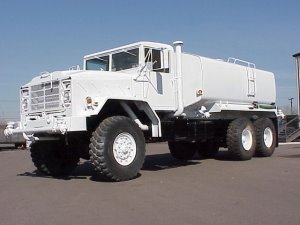cbs4denver.com - Natural Gas Well Water Trucks Can Explode:
(CBS4) DENVER They're called "water trucks" and are an important part of Colorado's booming natural gas industry. But the trucks aren't carrying regular water. Instead, the "produced water" can be dangerous and occasionally explode under certain circumstances, according to firefighters.
The trucks carrying the water are everywhere in Garfield, Mesa and Weld Counties. There is no state or federally mandated training for drivers who handle the "produced water." No special gear is required and the water is not regulated as a hazardous material.
The "produced water" contains hydrocarbons like benzene, toluene, and xylene. They're all chemical compounds that come from natural gas wells.
Last February, Dave and Evelyn Connors nearly lost their lives when Dave, a professional driver, used a blow torch to thaw the valve of a company water truck.
"The next thing I remember, I'm laying on the ground, and wondering where all the blood is coming from," said Evelyn Connors.
Drivers said it is a common practice in the industry, but the explosive gases came out of the "produced water" that had been sitting in the partially empty tanker overnight. A spark from the blow torch hit the gases, igniting the explosion.
"We was fragged from the explosion with metal and sand and ice out of the truck, first, second, third degree burns," said Dave Connors.
Fragments of the truck flew about a quarter-mile in the heavily residential neighborhood.
Mike Morgan, the fire chief in Rifle, is aware of "produced water's" potential and thinks there should be more education.
"If we convince ourselves that it's water, or that this stuff won't hurt you, that's when someone's going to get hurt or killed," Morgan said.
Morgan adds that water truck explosions are rare and "produced water" almost never poses a hazard driving down the highway when trucks have a full load. The risk starts to rise when the tanker is partially empty and hydrocarbons come out of the water and turn into combustible gas, he said. It would still take an ignition source like an open flame, spark or static electricity to make it dangerous.
"There's really very minimal risk," said Doug Hock, a spokesman for EnCana, an energy company. "Produced water has dissolved hydrocarbons in it and like any substance of this nature; you have to follow safe practices. If you follow safe practices, accidents can be prevented."
Hock said drivers who transport "produced water" aren't allowed to have open flames on a gas well site.
Firefighters said accidents do happen because of the growth in natural gas development and the surge of inexperienced drivers to meet that demand.
Many water truck explosions happen during the winter when drivers use a blow torch. Some trucking companies are starting to spend the money to add electric valve heaters so blow torches aren't necessary. But there are not federal or state rules that prohibit the use of a blow torch.
